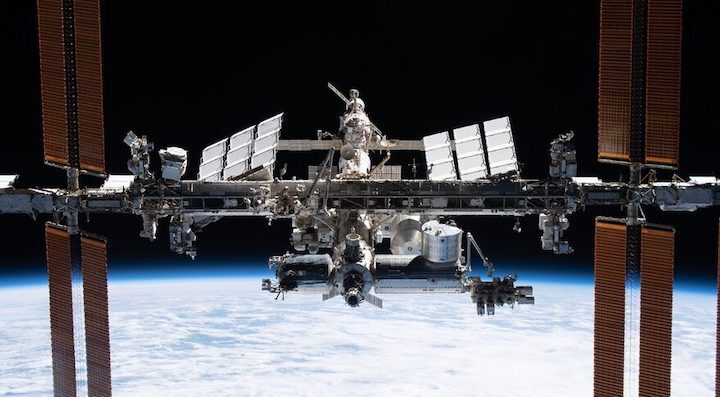7.03.2022

The recent invasion of Ukraine by Russia has strained relations between the Russian Federation and the rest of the world. That tension has spilled over into the realm of space cooperation.
According to Ars Technica, NASA expects that the Russian participation in the International Space Station (ISS) will continue. The theory is that the ISS is slated for another eight years of operational life. The Ukraine War will likely be resolved much sooner than that. Russian President Vladimir Putin, the source of so much tension on the world scene, may no longer be in power long before the ISS is slated to end.
Besides, Russia and the other ISS partners need each other. Without Russia and their Soyuz rockets to provide reboost and altitude control, the space station could undergo an uncontrolled reentry into the Earth’s atmosphere. Without the ISS, though, Russia doesn’t have much of a space program. Talk of Russia building its own space station is just talk, considering the state of that nation’s finances.
Nevertheless, Russian Federation space corporation Roscosmos head Dimitry Rogozin took to Twitter, according to Space.Com, with the following threat, “If you block cooperation with us, who will save the ISS from an unguided de-orbit to impact on the territory of the US or Europe? There's also the chance of impact of the 500-ton construction in India or China. Do you want to threaten them with such a prospect? The ISS doesn't fly over Russia, so all the risk is yours. Are you ready for it?"
SpaceX CEO Elon Musk responded to Rogozin’s question by posting the logo of his company, suggesting that he would step in and save the ISS from being crashed into the Earth. How that could happen has been a matter of some discussion.
Exactly how SpaceX would ride to the rescue of ISS is unclear. A thread has been posted on Twitter that shows a truncated ISS, without the Russian modules, with two Cargo Dragons and a Cygnus cargo spacecraft attached to provide both reboost and altitude control capabilities. The idea is that NASA and the other partners can maintain the ISS without Russian help.
At least one member of Congress has stated his enthusiastic support for booting the Russians from the ISS. Rep. Dan Crenshaw (R-Texas) tweeted, “Time to replace the Russians on the International Space Station. Kick them out of the program, train up some Ukrainian cosmonauts, and see if @elonmusk can replace the Russian half of the station with something that’s not falling apart.”
The question of both time and expense arises for any attempt to adjust for the absence of both Russian cosmonauts and Russian modules, which include service, lab and habitation space, on the ISS. The process might take months or even years and billions of dollars. A better option might be to terminate the ISS early and pour the money saved to stand up the commercial space stations NASA is helping to fund to eventually replace the ISS. A years-long “space station” gap that the space agency has endeavored to avoid would ensue, but it might be unavoidable.
If Russia were to be booted from the ISS or, as Rogozin suggested, leave in a huff, the Russian space program would have few if any good options. A few guest cosmonauts on the Chinese Tiangong space station would be a poor substitute for having been a full partner on the ISS.
If the invasion of Ukraine causes a total rift between Russia and the West, one more option exists for NASA to tighten the screws. Unlike Russia, Ukraine is a party to the Artemis Accords, the agreement signed by many nations governing activities on the moon and other worlds. NASA could, as Crenshaw suggests, recruit some Ukrainian astronauts, either representing a nation that has been liberated from the Russian invader or a government in exile. Then, one of these Ukrainians could be part of an early Artemis expedition to the moon.
Imagine the abject humiliation that Putin, if he is still alive and in power at the time, would feel at the sight of a Ukrainian walking on the moon. The Ukrainian moonwalker would unfurl the blue and yellow flag of his or her homeland, next to the Stars and Stripes, declaring, “Slava Ukraini! (Glory to Ukraine!), while 50 years after the Apollo race to the moon, no Russian has ever walked on the lunar surface. A Ukrainian moonwalker would be part of a delicious albeit symbolic revenge for the lives and treasure lost in the invasion of Ukraine.
Quelle: The Hill
